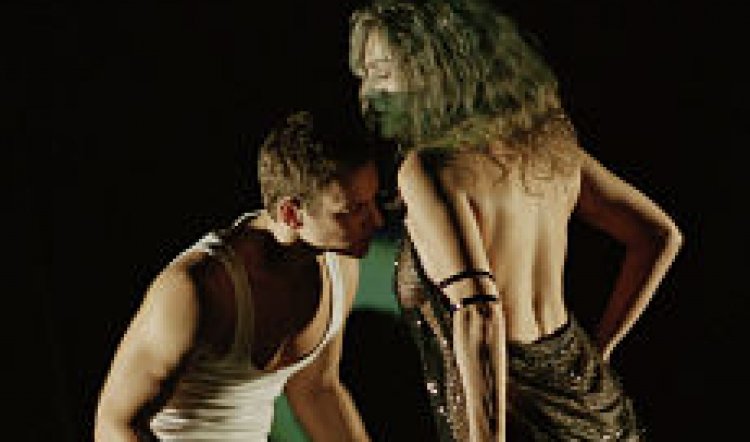
Barrie Kosky's Poppea
Barrie Kosky’s Poppea Sydney Opera House Adventures presents the Vienna Schauspielhaus production at the Drama Theatre, Sydney Opera House, 6-22 August 2009; www.sydneyoperahouse.com
MONTEVERDI was at the forefront of musical and theatrical experiment and transition from Renaissance to Baroque,so he would surely approve of, or at the very least understand, the experiment and transition Barrie Kosky has wrought upon L'incoronazione di Poppea.
Kosky has taken the beautiful musical bones and monstrous story of Poppea and seamlessly interwoven into them a selection of Cole Porter songs. It is a leap of imagination and musicality that is simply dazzling.
Performed partly in surtitled German and partly in admirably clear English, Poppea is the essence of the opera, which itself is the essence of storytelling and drama. And before any lemon-lipped opera traditionalist starts accusing Kosky of travesty and bastardry or razzle dazzle or whatever evil he’s committing this week, let’s recall the fabulously grotesque original on which this new work is based.
It tells of Emperor Nero’s passion for the scheming sexy vixen Poppea; of Empress Ottavia’s jealousy and plot for revenge in coercing Ottone to murder Poppea – whom he also adores – and Drusilla’s enthusiasm for the idea because in her turn, she loves Ottone. Looking on from his bathtub and perhaps making sense of all this is Nero’s mentor Seneca (Florian Carove) and – a purely Kosky touch here – the character or icon of Amor is transformed into a sardonic observer of all in the form of a luscious Maria Venuti-style madame.
In addition, Monteverdi’s original production called for a contralto castrato and a soprano castrato, as well as the usual complement of unsnipped singers, so you’d have to say today’s out-there extremes and weirdnesses in art have little on the old days. As it is, this view of ancient Rome is one that might have been envisioned by George Grosz – all savagely satirical surfaces over deeply humane interiors.
To further confuse the easily confused, Kosky has cast singing actors in the roles, rather than singers who can do a bit of acting. The result is exhilarating and electrifying as each takes his or her own instrument to its wildest extremes of range and emotion, without a care for operatic niceties. As Poppea Melita Jurisic is sensual, dangerous and physically bold beyond imagining. As the hapless but gorgeous Ottone Martin Niedermair is a vision straight out of Fassbinder’s Querelle in his clinging singlet and half-hitched sailor’s whites.

As the acerbic yet sumptuously upholstered goddess of Love, Barbara Spitz embodies the dualities of the Kosky approach: she is by turns funny and detached, lonely and engaged and always watchable. Nero, on the other hand, is unexpectedly tragic as the man in thrall to his base instincts and bewildered by power and its consequences, Kyrre Kvam combines strength and profound weakness and makes it look unnervingly easy.
The other side of power and madness is manifest in Drusilla (Ruth Brauer-Kvam) and Ottavia (Beatrice Frey). Each is helplessly in love with a faithless or unattainable man but neither is remotely helpless when it comes to doing something about it. Their choices might seem extreme – but no more so than Lorena Bobbit’s, or the more recent trio of gals who superglued the offending dick to its owner’s belly! Murder is as murder does and wandering men should perhaps beware.
Leading from the pit and piano is the maestro himself, with a trio of strings players: Aisha Buka, Linde Gansch and Jorg Ulrich Krah making an orchestra as pared back yet effective as the piece itself. Kosky is the most amazing maker of theatre and when you begin to look at how he’s laced the Cole Porter songs through the narrative, his imagination and bravado are simply astonishing.
“Ev’ry Time We Say Goodbye” becomes a heart-rending expression of despair in a world turned upside down; “So In Love” is downright mocking in its prettiness, while “Anything Goes” is a sprightly anthem for the dark excesses of Nero’s Rome. Once again, the contrasts and contradictions and Kosky’s eclectic pleasure in such delights as tango and klezmer are what fuse the music of composers who are otherwise 400 years apart.
Altogether, Kosky’s Poppea is as delicious, delightful, delovely and debauched as some of might hope and others might suspect. It’s also impossible to adequately describe, so do please go along and be de-daring – it will repay the effort a thousandfold.



